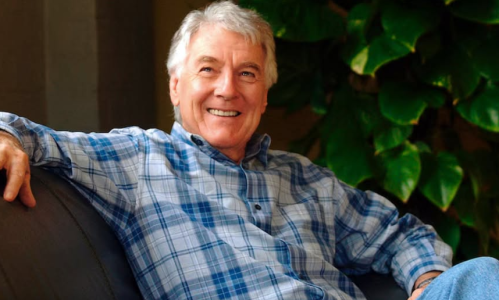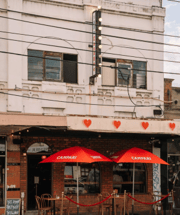Iconic entertainer dies at 89 leaving music world reflecting on lost pioneer
By
Gian T
- Replies 0
A loss like this doesn’t just affect one industry—it touches generations of memories, milestones, and music.
One of Australia’s most influential voices has fallen silent, leaving behind a legacy that helped shape the nation’s sound.
As tributes pour in, many are reflecting on just how much one person’s passion can echo through time.
Col Joye’s journey began in Sydney in 1957, when he joined his brother Kevin’s band, then called the KJ Quintet.
In a twist of fate (and perhaps a dash of youthful bravado), the group rebranded themselves as 'Col Joye and the Joy Boys' for a gig at the Manly Jazzerama.
According to the National Portrait Gallery, the band later joked that they 'regretted' the impulsive name change—but it stuck, and so did their infectious sound.
Col Joye quickly became a household name, and in 1959, he made history as the first Australian pop star to reach number one on the local charts with the single ‘Bye Bye Baby’.
The track featured backing vocals from The Sapphires, Australia’s first all-female, all-First Nations singing group—a collaboration that broke new ground in more ways than one.
Throughout the early 1960s, Col and the Joy Boys rode the rock ‘n’ roll wave, racking up a string of top 10 hits and helping to define the era’s sound.
Their music was the soundtrack to countless dances, parties, and Saturday nights across the country.
But Col’s impact went far beyond his own performances. In the 1960s, he opened ATA Studios in Glebe, Sydney, launching a successful career as a talent scout, manager, and record label boss.
It was here, in 1963, that he stumbled upon a group of young performers from Redcliffe, Queensland, who called themselves the Bee Gees.
At the time, the Bee Gees were just another struggling act, playing Queensland resorts to make ends meet.
Col Joye saw their potential and helped them take their first steps towards stardom.
While their paths eventually diverged, the Bee Gees would go on to become one of the most successful bands in music history—a testament to Col’s keen eye for talent.
Col’s career wasn’t limited to the stage and studio. In 1966, he travelled to Vietnam to perform for Australian troops stationed at Nui Dat, sharing the bill with Little Pattie.
Their performance coincided with the infamous Battle of Long Tan, which unfolded less than 10 kilometres away—a stark reminder of the power of music to bring comfort in the darkest of times.
Even after his chart-topping days, Col continued to make music, producing his final hit, the country-tinged ‘Heaven is my Woman’s Love’, in 1973.
His resilience was legendary; after suffering serious injuries in a 1990 fall from a neighbour’s tree, he made a remarkable recovery and was back touring by 1998.
In retirement, Col Joye remained dedicated to preserving Australia’s musical heritage. He donated more than 1,200 items to the National Film and Sound Archive, ensuring that future generations could experience the magic of his era.
Col’s contributions were recognised with numerous honours, including his appointment as a Member of the Order of Australia (AM).
But perhaps his most incredible legacy is the joy he brought to millions of Australians through his music, mentorship, and unwavering passion for the industry.
As we say goodbye to Col Joye, we remember not just the hits but the man behind them: a pioneer, a mentor, and a true Aussie legend.
His story is woven into the fabric of our musical history, and his influence will be felt for generations to come.
Credit: YouTube
 Did you ever see Col Joye perform live, or do you have a favourite memory or song? We’d love to hear your stories and tributes in the comments below.
Did you ever see Col Joye perform live, or do you have a favourite memory or song? We’d love to hear your stories and tributes in the comments below.
Read more: Music world pauses as quiet farewell of icon stirs fresh memories
One of Australia’s most influential voices has fallen silent, leaving behind a legacy that helped shape the nation’s sound.
As tributes pour in, many are reflecting on just how much one person’s passion can echo through time.
Col Joye’s journey began in Sydney in 1957, when he joined his brother Kevin’s band, then called the KJ Quintet.
In a twist of fate (and perhaps a dash of youthful bravado), the group rebranded themselves as 'Col Joye and the Joy Boys' for a gig at the Manly Jazzerama.
According to the National Portrait Gallery, the band later joked that they 'regretted' the impulsive name change—but it stuck, and so did their infectious sound.
Col Joye quickly became a household name, and in 1959, he made history as the first Australian pop star to reach number one on the local charts with the single ‘Bye Bye Baby’.
The track featured backing vocals from The Sapphires, Australia’s first all-female, all-First Nations singing group—a collaboration that broke new ground in more ways than one.
Throughout the early 1960s, Col and the Joy Boys rode the rock ‘n’ roll wave, racking up a string of top 10 hits and helping to define the era’s sound.
Their music was the soundtrack to countless dances, parties, and Saturday nights across the country.
But Col’s impact went far beyond his own performances. In the 1960s, he opened ATA Studios in Glebe, Sydney, launching a successful career as a talent scout, manager, and record label boss.
It was here, in 1963, that he stumbled upon a group of young performers from Redcliffe, Queensland, who called themselves the Bee Gees.
At the time, the Bee Gees were just another struggling act, playing Queensland resorts to make ends meet.
Col Joye saw their potential and helped them take their first steps towards stardom.
While their paths eventually diverged, the Bee Gees would go on to become one of the most successful bands in music history—a testament to Col’s keen eye for talent.
Their performance coincided with the infamous Battle of Long Tan, which unfolded less than 10 kilometres away—a stark reminder of the power of music to bring comfort in the darkest of times.
Even after his chart-topping days, Col continued to make music, producing his final hit, the country-tinged ‘Heaven is my Woman’s Love’, in 1973.
His resilience was legendary; after suffering serious injuries in a 1990 fall from a neighbour’s tree, he made a remarkable recovery and was back touring by 1998.
In retirement, Col Joye remained dedicated to preserving Australia’s musical heritage. He donated more than 1,200 items to the National Film and Sound Archive, ensuring that future generations could experience the magic of his era.
Col’s contributions were recognised with numerous honours, including his appointment as a Member of the Order of Australia (AM).
As we say goodbye to Col Joye, we remember not just the hits but the man behind them: a pioneer, a mentor, and a true Aussie legend.
His story is woven into the fabric of our musical history, and his influence will be felt for generations to come.
Credit: YouTube
Key Takeaways
- Aussie pop-rock legend Col Joye, known for fronting Col Joye and the Joy Boys and 'discovering' the Bee Gees, has died aged 89.
- Joye was the first Australian pop star to reach number one on local charts with ‘Bye Bye Baby’ in 1959, backed by The Sapphires, Australia’s first all-female, all-First Nations singing group.
- Beyond performing, Joye was a pioneer in talent scouting, management, and record label operations, opening ATA Studios and helping launch iconic acts like the Bee Gees.
- Despite a serious injury in 1990, Joye kept performing into his later years and donated over 1200 items to the National Film and Sound Archive during his retirement.
Read more: Music world pauses as quiet farewell of icon stirs fresh memories








